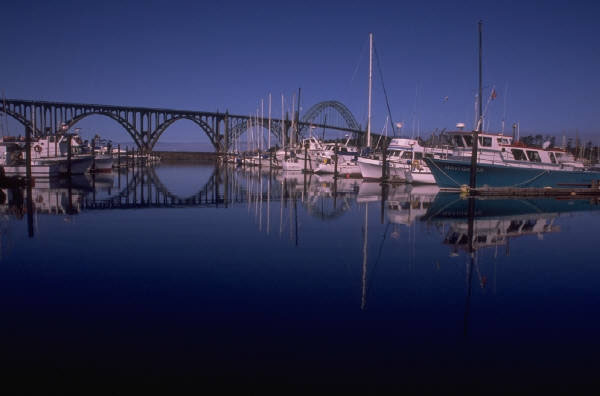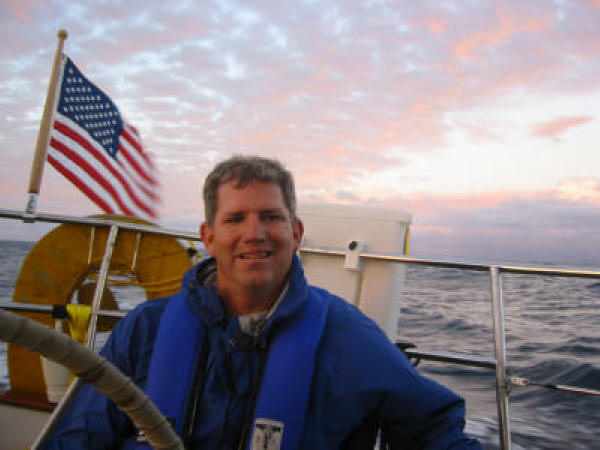BlindSailing.com
"Dream The Impossible Dream!"
BlindSailing
ph: 202-642-3335
About the Voyage
The Challenge!
On October 11, 2004 we put the Golden Gate Bridge astern in a bid to become the first legally blind people to circumnavigate the world independently in a sailboat. We define this further as sailing our vessel around the world, across all oceans and seaways, without the assistance of sighted crew onboard. However, to minimize the dangers of collision for ourselves and others we will allow the assistance from pilot boats once we reach crowded foreign ports.
Why?
Why sail around the world if you are visually impaired? What are you trying to prove?
In Scott’s words:
First and foremost, I would probably have undertaken this goal if I were fully sighted. I grew up near the beach in Santa Monica and I have always loved the water. I was a swimmer in school, and I later became a certified diver. I have always dreamed about sailing around the world, and I am a person who deeply believes that we should all pursue our dreams.
I would also like my challenge to encourage anyone living with vision loss. The world has a way of placing limitations on anyone who does not fit the "normal" mold. From birth doctors told my parents that I would never be "normal". "Don't expect much from him and you may consider sending him to a residential school or institution". Unfortunately, this has been a constant theme throughout my life.
To sail around the world will be one more accomplishment in a long line of accomplishments made by visually impaired people that sends a signal to everyone, the capabilities bar has been raised one more notch for people who are blind.
For a number of years I was a staff member at Camp Bloomfield (www.fjb.org) and later I became the Camp Director at Enchanted Hills Camp (www.lighthouse-sf.org), both summer camps for blind children and teenagers. We would sit at campfire and discuss our equality in the world and the philosophy that if we tried hard enough then we could accomplish just about anything. In some way this effort is a way for me to put my money where my mouth was and do something truly challenging. If I succeed I will be pleased. If I fail, I will be pleased for trying. If I don't do this, I will always wonder why I never tried.
Scott's Vision

Normal Vision
Scott's Vision
What is legal blindness?
In lay terms a person who is legally blind may have partial vision, but has a significant enough vision loss to be considered blind, and therefore qualify for disability benefits/services... You would probably not lend a legally blind person your car keys for the weekend.
The legal definition is:
Legal blindness refers to clinically measured visual acuity of 20/200 in the better eye with best correction, or visual field of 20 degrees or less.
About Scott

General Overview
I am currently forty-one years old. I was born in Southern California and have lived most of my life in California. San Francisco has been my home for the sixteen years prior to my departure to sail around the world. I grew up in a family of four, consisting of my parents and one older sister.
Sailing Background
When I was thirteen I was bitten by the sailing bug. A friend of mine and his father took me on a camping trip to a small lake in central California. At the lake they had a few Laser dinghies available to anyone utilizing the camp grounds. At this point in my life I was staring down the nose at not being able to drive while my friends were thinking about and saving for their dream cars. The first time I had the tiller in my hand it was love at first sail! All of a sudden I could be in control of driving something, and though it wasn’t a car, it was exquisite and exhilarating!
Since those early days sailing I took every opportunity I could to be on the water, from renting pedal boats and sailing dinghies, to chartering rides on cats and classic tall ships. In 1999 I purchased by first keelboat “Emily” a 27’ Ericson sloop and I was on my way exploring my new playground - San Francisco Bay.
In 2002 I took my first step towards the Blind Circumnavigation by purchasing “Tournesol” a Valiant 32, cutter rigged cruising boat. At the time I was just becoming conscious of the fact that I wanted to sail around the world, though I think the idea had been lurking somewhere in the back of my mind for years. At this point I started seriously training in the bay, while also taking a number of formal sailing classes. Eventually I completed training to the highest level of US Sailing coursework available to me. On October 11, 2004 Pamela Habek and I set out to start our adventure attempting to become the first legally blind people to sail around the world without sighted assistance.
My Vision Loss
I was born with bilateral congenital Colaboma a vision pathology that prevents parts of the eye from developing prenatal. Both of my retinas developed without the formation of optic receiving light cells in many areas, which create scatombas (blind spots) throughout my visual field, causing almost complete blindness in my right eye. My left eye has a visual acuity of approximately 20/450’ with greatly reduced central vision. To make matters a little more interesting I was diagnosed with cataracts in my mid thirties and underwent cataract surgery on both eyes. With the removal of my natural lenses I can no longer read standard sized print without the use of strong hand-held magnifiers or a video magnifier. My overall visual acuity roughly equals 5% of the total vision experienced by a person without a visual impairment.
Growing up I was fortunate to benefit from a wide variety of resources to assist me in adapting to my vision loss. In elementary school I had a state-of-the-art resource classroom available to me, providing me with the latest adaptive technologies available at the time. This gave me a comfort level with adaptive technology that has greatly enhanced my ability to adapt to my vision loss. During middle school and high school I had an itinerate teacher available to me. And though at the time I thought she was a Dragon Lady, she pushed me to excel in areas like typing, that would further my ability to adapt to my vision loss.
I was also fortunate to receive services from the Foundation for the Jr. Blind, a Los Angeles based not-for-profit agency providing recreation services to blind and partially sighted youth. Among the services that are offered by the Foundation is Camp Bloomfield, a residential summer camp for visually impaired children, nestled in the Malibu Mountains. Of all the services I received as a young visually impaired person, it was my time at summer camp that most prepared me to understand and develop my own philosophy regarding living as a person with a disability.
Philosophy on disability is probably as varied as the many disabilities throughout the world. There are some disabled people that identify themselves as people living with an “inconvenience” while living equally side by side in the world with people without disabilities. My personal philosophy is similar in some ways, though in other ways it is distinctly different. I see myself as a visually impaired person first, and I embrace this distinction and its accompanying culture. I further believe that as a visually impaired person living with a disability, I can successfully integrate in the non disabled world. However, I see my disability not as an inconvenience (although it can be), I see my vision loss as one of the significant characteristics that defines and makes me who I am. I have come to believe whole heartedly that I would rather be a proud and skilled visually impaired person, rather than a person fighting to prove their equality to a “normal” or non disabled person.
Professional and Educational Background
I received dual Bachelor degrees in Human Development and Sociology from the University of California at Riverside. I furthered my education at San Francisco State University where I received a Masters degree in Special Education and Rehabilitation Teaching. I have worked in the vision loss field for nearly 25 years, stemming from my early years working at summer camp, to various roles in non profit administration. I later became involved in rehabilitation through assistive technology and eventually started AccessAbility, Inc. in 1997. AccessAbility was an assistive technology company that specialized in adaptive worksite development, and training. Along with my partner Steven Clark we grew the business until it was sold in 2002. Since this time I have focused my energy towards preparing for the Blind Circumnavigation. I still occasionally work as a consultant in the assistive technology field when time permits or the cruising kitty demands to be fed.
Copyright 2009 The Blind Circumnavigation. All rights reserved.
BlindSailing
ph: 202-642-3335
